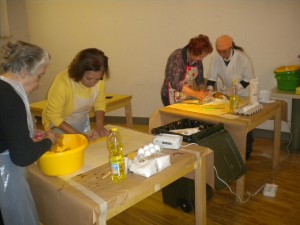FOOD – Ciambellette, the Roman Cookies for a Sweet Passover
As Passover approaches, each Jewish family around the world gets ready for the holiday, not just by removing every single crumb of hametz from the house, but also by reviving some of the longest-lasting family traditions in Jewish history. In the Jewish community of Rome – the oldest one in Europe – one of the main Pesach traditions is a recipe, known as the “ciambellette”, tiny donut-shaped cookies.
According to the Jewish law, during Passover Jews are not allowed to eat any leavened food (also known as hametz). In order to avoid the unwanted preparation of hametz, which might occur by mixing flour and water and by letting the mixture leaven for more than 18 minutes, religious Jews usually avoid home preparation of foods that could become forbidden.
Until a few years ago, right before the beginning of Passover, many Jewish families in Rome would gather and prepare the “ciambellette”, made of kosher for Passover flour, eggs, oil, and sugar. Before the preparation began, all the sinks in the kitchen were closed, and the water that could mix by mistake with the cookie dough was removed. The “ciambellette” were traditionally prepared in a few minutes, then baked.
Today, due to a decision made by the Chief Rabbinate of Rome in 2010, the kosher flour for Passover flour is no longer sold to the public. The community, though, is able to perpetuate the tradition of the “ciambellette” thanks to a supervised, collective baking at the Italian Jewish Center “Il Pitigliani”. Not only the ingredients, but the preparation, as well, are controlled by a supervising rabbi or mashgiach. People can book their spot and take their own kosher “ciambellette” home – a great compromise between industrial production and unsupervised, home production.
Follow Simone on Twitter: @simonsays101

